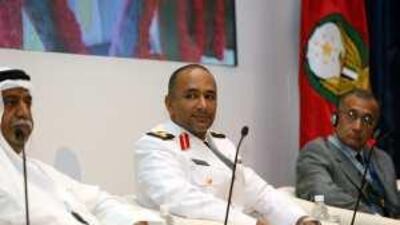ABU DHABI // A larger network of multinational ships, with more input from regional navies, is needed to tackle increasing security threats in the Indian Ocean, navy officials said yesterday. Commanders and chiefs of staff from 32 nations in the region met in the capital's Yas Hotel for the second Indian Ocean Naval Symposium (Ions). Discussions ranged from piracy to smuggling and terrorism.
"In the past two decades, we've seen many security challenges which have had an influence on the maritime environment," said Brig Ibrahim al Musharakh, commander of the UAE Navy. The challenges come from both states and individual actors, he added. "All of these phenomena can be dealt with by one solution, and that is co-operation." Addressing delegates, Admiral Arun Prakash, the former chief of the Indian navy, suggested a "regional maritime concord" in which Ions members would agree to pledge ships, support and logistics for a multinational force.
"Once the governments in the region have agreed to the idea, then it doesn't take much doing," he said. Nato, the European Union and the multinational Combined Maritime Forces patrol the Gulf of Aden and the Arabian Gulf, while the Indonesian, Malaysian and Singaporean navies protect the strategic Malacca Straits with joint patrols. Navies are already "co-operating in an unprecedented way", said Cmdr Bob Tarrant, the British navy's director of staff. But he said there was still room to build given the "huge" 73.6 million-square-kilometre body of water that stretches from the eastern coast of Africa to Australia and Indonesia.
"The risks that affect it are greater than individual nations can deal with," he said. How a multinational force would work with or incorporate security alliances and patrols will need to be worked out, Adml Prakash said. Vice Admiral Bill Gortney, commander of the United States' Bahrain-based 5th Fleet, touted a similar idea of a "global maritime partnership", based on the "1,000-ship international navy" the US has espoused in the past, adding that even small navies can make a big contribution.
Cmdr Tarrant said he expected an Indian Ocean regional maritime force to be the main topic of conversation between commanders in closed-door meetings during the three-day summit. "The states which surround the Indian Ocean have a very legitimate and important interest in their own region," he said. Captain Hussein Khanzadi, a delegate representing the Iranian navy, said extra-regional forces had "failed" in their mission to bring security to the seas of the region and wipe out piracy, and therefore security should be handed to a purely regional force.
But Cmdr Tarrant said the impact was difficult to measure and "given the importance of the Indian Ocean, and the trade that flows across it", nations outside the region should still be involved in its security. "I do believe that efforts have to be made through an international force, but there's no question in my mind that the greater sustainment of a longer-term solution is created by regional solutions," he said.
The limitations of tackling piracy and maritime threats at sea were also discussed. Vice Adml Gortney described current efforts as "dealing with the symptoms" instead of the "cancer ashore". The legal difficulties of bringing detained pirates to justice will also be discussed during the symposium. Adml Prakash said there was a need to approach the United Nations to form a legal framework to bring pirates to justice.
lmorris@thenational.ae

